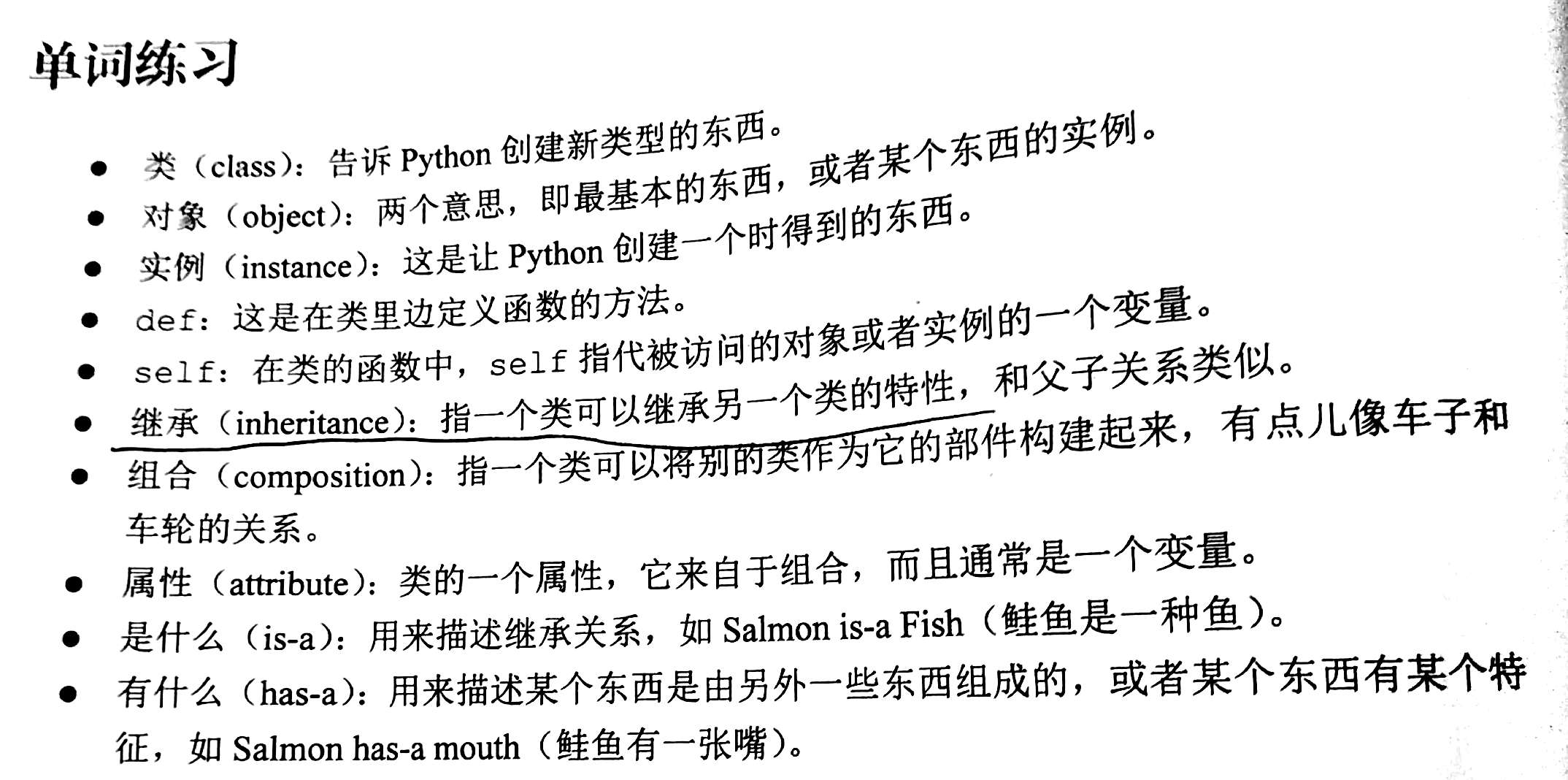《 笨方法學 Python 》_ 習題 40
阿新 • • 發佈:2019-01-31
習題 40:模組、類和物件
模組是包含函式和變數的 Python 檔案,可以匯入這個檔案,可以使用 "." 操作符訪問模組中的函式和變數。
模組還可以用一種方法去理解:可以把它們當做一種特殊的字典,通過它們可以儲存一些 Python 程式碼,可以通過 "." 操作符訪問這些程式碼。Python 還有一種另外一種程式碼結構用來實現類似的目的,那就是類,通過類,你可以把一組函式和資料放到一個容器中,從而用 "." 操作符訪問類中的函式和變數。
現在有三種方法可以從某個東西里獲取東西:
# dict sytle mystuff['apples'] # module style 呼叫模組 mystuff.apples() # 訪問模組的函式 mystuff.tangerine # 訪問模組的變數 # class style thing = MyStuff() 呼叫類 thing.apples() # 訪問類的函式 thing.tangerine # 訪問類的變數
class Song: def __init__(self, lyrics): self.lyrics = lyrics def sing_me_a_song(self): for line in self.lyrics: print(line) happy_bday = Song(["Happy birthday to you", # 呼叫類 "I don't want to get sued", "So I'll stop right there"]) bulls_on_parade = Song(["There rally around the family", "With pockets full of shells"]) happy_bday.sing_me_a_song() bulls_on_parade.sing_me_a_song()
建立 __init__ 或者別的類函式時需要多加一個 self 變數。
習題 41:學習面向物件術語
import random import urllib.request import sys WORD_URL = "http://learncodethehardway.org/words.txt" WORDS = [] PHRASES = { "class %%%(%%%):": "Make a class named %%% that is-a %%%.", "class %%%(object):\n\tdef __init__(self, ***)": "class %%% has-a __init__ that takes self and *** parameters.", "class %%%(object):\n\tdef ***(self, @@@)": "class %%% has-a function mnamed *** that takes self and @@@parameters.", "*** = %%%()": "Set *** to an instance of class %%%.", "***.***(@@@)": "From *** get the *** function, and call it with parameters self, @@@.", "***.*** = '***'": "From *** get the *** attribute and set it to '***'." } # do they want to drill phrases first PHRASE_FIRST = False if len(sys.argv) == 2 and sys.argv[1] == "english": PHRASE_FIRST = True # load up the words from the website for word in urllib.request.urlopen(WORD_URL).readlines(): WORDS.append(word.strip()) def convert(snippet, phrase): class_names = [w.capitalize() for w in random.sample(WORDS, snippet.count("%%%"))] other_names = random.sample(WORDS, snippet.count("%%%")) results = [] param_names = [] for i in range(0, snippet.count("@@@")): param_count = random.randint(1, 3) param_names.append(', '.join(random.sample(WORDS, param_count))) for sentence in snippet, phrase: result = sentence[:] # fake class names for word in class_names: result = result.replace("%%%", word, 1) # fake other names for word in other_names: result = result.replace("***", word, 1) #fake parameter lists for word in param_names: result = result.replace("@@@", word, 1) results.append(result) return results # keep going until they hit CTRL-D try: while True: snippets = list(PHRASES.keys()) random.shuffle(snippets) for snippet in snippets: phrase = PHRASES[snippet] qusetion, answer = convert(snippet, phrase) if PHRASE_FIRST: question, answer = answer, question print(question) input("> ") print("ANSWER: %s\n\n" % answer) except EOFError: print("\nBye")
程式執行出現錯誤,尚未解決。
result = sentence[:]
# Python 中複製列表的的方法,使用"列表切片"語法 [:] 對列表中的所有元素進行切片操作習題 42:物件、類及從屬關係
## Animal is-a object
class Animal:
pass
## Dog is-a Animal
class Dog(Animal):
def __init__(self, name):
self.name = name
## Cat is-a Animal
class Cat(Animal):
def __init__(self, name):
self.name = name
## Person is-a object
class Person:
def __init__(self, name):
self.name = name
self.pet = None
## Employee is-a Person
class Employee(Person):
def __init__(self, name, salary):
super(Employee, self).__init__(name)
self.salary = salary
## Fish is-a object
class Fish:
pass
## Salmon is-a Fish
class Salmon(Fish):
pass
## Halibut is-a Fish
class Halibut(Fish):
pass
## rover is-a Dog
rover = Dog("Rover")
## satan is-a Cat
satan = Cat("Satan")
## mary is-a Person
mary = Person("Mary")
## mary has-a pet, satan is-a cat
mary.pet = satan
## frank is-a Employee
frank = Employee("Frank", 120000)
## frank has-a pet
frank.pet = rover
## flipper is-a Fish
flipper = Fish()
## crouse is-a Salmon
crouse = Salmon()
## harry is-a Halibut
harry = Halibut()




